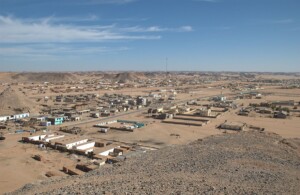Marches mark 55th anniversary of October Revolution across Sudan
Thousands of Sudanese took to the streets of Khartoum and all major cities across the country today to mark the 55th anniversary of the 1964 ‘October Revolution’ that overthrew the junta of Maj Gen Ibrahim Abboud to usher in general elections the next year.
 People gather in Freedom Square in Khartoum today to celebrate the 55th anniversary of the October Revolution (RD Correspondent)
People gather in Freedom Square in Khartoum today to celebrate the 55th anniversary of the October Revolution (RD Correspondent)
Thousands of Sudanese took to the streets of Khartoum and all major cities across the country today to mark the 55th anniversary of the 1964 ‘October Revolution’ that overthrew the junta of Maj Gen Ibrahim Abboud to usher in general elections the next year.
The marches that spanned the length and breadth of the country called for the National Congress Party (NCP) of ousted President Omar Al Bashir to be banned, and that all “remnants of the old regime’”, the so called “deep state” who still hold official positions be dismissed. They also called for all members of the former regime and its organs who have committed crimes and atrocities to be brought to justice.
As evening fell in Khartoum, the public gathered in Freedom Square to hear music by popular Sudanese artists (see video)
In his speech to the Sudanese people to mark the anniversary, Sudan’s Prime Minister Abdallah Hamdok affirmed that the October Revolution in 1964 is considered “a qualitative starting point in the field of the Sudanese popular revolutions.”
“The October Revolution in 1964 is considered a qualitative starting point in the field of the Sudanese popular revolutions” – Prime Minister Hamdok
Hamdok asserted that “in these revolutions, tyranny, hegemony, and oppression were defeated every time, and the values of freedom and democracy have triumphed through purely popular sacrifices.” Hamdok indicated that the people have never hesitated from realising change and paid high prices for its achievement throughout history.

He said: “These sacrifices alone are sufficient for the resolve to prolong this immediate victory, and to sponsor it until it becomes stronger, and until these values become a fixed habit that is not broken by looting or disruption by a coup.
Hamdok stressed that “these values must be sustainable and consolidated along with justice, equity, peace, stability, and development,” pointing out that “revolutions in Sudan did not happen by coincidence”, and that “victories are not luck, nor are the sacrifices transient wounds.”
What is known in Sudan as the October Revolution broke out on October 21, 1964 against a junta led by Major General Ibrahim Abboud, who himself overthrew the previous parliamentary regime in a bloodless coup d'état.
The Abboud regime was followed by a provisional government until parliamentary elections in April 1965 led to a coalition government under Prime Minister Mohamed Ahmed Mahjoub.




Radio Dabanga’s editorial independence means that we can continue to provide factual updates about political developments to Sudanese and international actors, educate people about how to avoid outbreaks of infectious diseases, and provide a window to the world for those in all corners of Sudan. Support Radio Dabanga for as little as €2.50, the equivalent of a cup of coffee.












 and then
and then